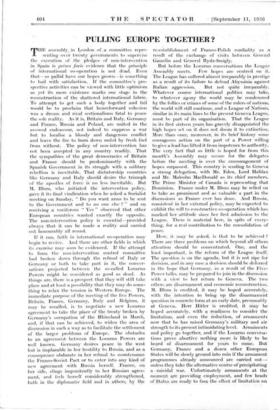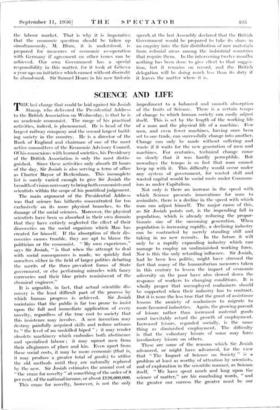PULLING EUROPE TOGETHER ?
THE assembly in London of ,a committee repre- senting over twenty governments to supervise the execution . of . the . pledgeS of non-intervention in Spain is prima fade .evidence that the principle of international co-operation is not dead. Even that—so pallid have our hopes grown—is something to hail with satisfaction. If the committee's pro- spective activities can be viewed with little optimism. as yet its mere existence marks one stage in the reconstruction of the shattered international fabric. To attempt to get such a body together and fail • would be to proclaim that henceforward cohesion was a dream and rival sectionalisms fatal to peace the sole reality. As it is, Britain and Italy, Germany and France, Russia and Poland, are united in the avowed endeavour, not indeed to suppress a war but to localise a bloody and dangerous. conflict and leave the fire to burn down unfed by fresh fuel from without. . The policy of non-intervention has • not been accepted in any country readily. That the sympathies of the great democracies of Britain and France should be predominantly with the Spanish Government in its struggle with a military rebellion is inevitable. That dictatorship countries like Germany and Italy should desire the triumph of the apostles of force is no less inevitable. But M. Blum, who initiated the intervention policy, gave it its final vindication when he asked a Socialist meeting on Sunday, " Do you want arms to be sent to the Government and to no one else ? " and on receiving a vociferous " Yes " observed that other European countries wanted exactly the opposite. The non-intervention policy is essential—provided always that it can be made a reality and carried out honourably all round.
If it can, faith in international co-operation may begin to revive. And there are other fields in which its exercise may soon be evidenced. If the attempt to form the non-intervention control committee had broken clown through the refusal of Italy or Germany or both to take part in it, the conver- sations projected between the so-called Locarno Powers might be considered as good as dead. As things are, there is a prospect that they. mill still take place and at least a possibility that they may do some- thing to relax the tension in Western Europe. The immediate purpose of the meeting of the five Powers; Britain, France, Germany, Italy and Belgium, it may be recalled, is to negotiate a new Locarno agreement to take the place of the treaty broken by Germany's occupation of the Rhineland in March, and, if that can be achieved, to widen the area of discussion in such a way as to facilitate the settlement of the larger problems of Europe. The obstacles to an agreement• between the Locarno Powers are well known. Germany desires peace in the west but is implacable in her hostility to Russia, and as a consequence obdurate in her refusal to countenance the Franco-Soviet Pact or to .enter into. any kind of -new agreement with Russia herself., ..France.: on her side, clings impenitently to her Russian agree ment, and feels herself considerably strengthened, both in the diplomatic field and in others, by the re-establishment of Franco-Polish cordiality as ,a result of the exchange of visits between General Gamelin and General Rydz-Smigly.
But before the Locarno, conversations the . .
• Assembly meets. . Few hopes are centred on it The League has suffered almost irreparably in prestige as a result of its failure to defend Abyssinia against Italian aggression. But not quite irreparably.
• Whatever. course international politieS may take, to whatever agony the world may be condemned by the follies or crimes of some of the rulers of natio*, the world will still continue, and a League of .Nations, similar in its main lines to the present Geneva,League, must be part of its organisation. That the League in its first sixteen yearl has gravely disappointed. the high hopes set on it does not doom it to extinction. More than once, Moreover, in its brief history some . courageous action on the part of a Power willing to give a lead has lifted it from impotence` to authority. The very fact that so little is hoped for from this month's Assembly may secure for the delegates . before the meeting is over the . encouragement of hopes surpassed. This country is sending to Geneva a strong delegation, with Mr. Eden, Lord Halifax and Mr. Malcolm MacDonald as its chief members,. The Prime Minister of Canada is representing that Dominion. France under M. Blum may. be relied on to take as prominent and as valuable a part in the discussions as France ever has done. And Russia, consistent in her external policy, may be expected to exhibit the will to constructive co-operation .which has marked her attitude since her first admission to the League. There is material here, in spite of every- thing, for a real contribution to the consolidation of peace.
How, it may be asked, is that to be achieved ? There are three problems on which beyond all Others attention should be concentrated. One, and the least important, is the reform of the League itself. The question is on the agenda, but it is not ripe for decision, and in any case a decision should be deferred in the hope that Germany, as a result of the Five- Power talks, may be prepared to join in the diseusSion with a view to her return to Geneva. The two others are disarmament and economic reconstruction.: M. Blum is credited, it may be hoped accurately, with, the _intention to bring up the disarmament question in concrete form at an early date, presumably at Geneva. Herr Hitler is credited, it May be hoped accurately, with a readineSs to consider the limitation, and even the reduction, of armaments now that he has raised Germany'S military and air strength to its present intimidating level. Armainenti and policy go together, and if the Locarno Conversa- tions prove abortive nothing more, is'. likely to --be heard of disarmament for sr* ea'is to come: But Germany, France and a dozen other European States will be. slowly ground into ruin if the armament programmes already announced are carried out-- unless they take the alternative course of precipitating a suicidal . war. Unfortanately armaments at the moment are_ providing employment, and few heads of $tates are ready to face the effect of limitatidn on the labour market. That is why it is imperative, that the economic question should be 'taken up simultaneously. M. Blum, it is understood, is prepared fore measures of economic co-operation with Germany if agreement on other issues can be achieved. Our own Government has a special responsibility in this matter, for it took at' Galeva a year ago an initiative which cannot without discredit be abandoned. -Sir- Samuel Hoare in his now historic speech. at the last Assembly declared that the British -GoVernment ould be prepared to take its share in an enquiry into the fair distribution of raw materials from colOnial areas among the industrial countries that require them. In the intervening twelve months nothing has been done to give effect to that sugges- tion, but it remains on record, and the British delegation will be doing much less than its duty if it leaves the matter where it is.













































 Previous page
Previous page